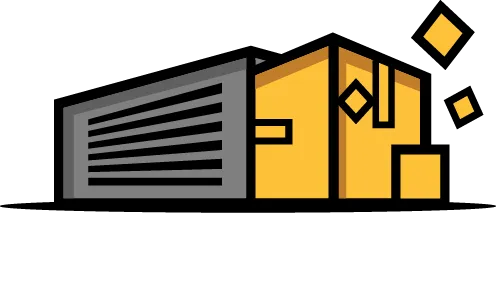Quick Jump
Choosing the right warehouse type is a critical decision for companies involved in international trade, especially those importing high volumes of goods. Among the most strategic storage options are bonded warehouses and Foreign Trade Zone (FTZ) warehouses. Both offer ways to defer or reduce duty and taxes, but they differ in structure, operations, and benefits.
This article explains the differences between the two, highlights the benefits of each, and outlines how to decide which is the better fit for your logistics needs.
What is a Bonded Warehouse?
A bonded warehouse is a secure storage facility authorized by customs authorities where imported goods can be stored without the immediate payment of duty or import taxes. These goods may remain in the warehouse for a set period—up to five years in the United States—without entering the customs territory. This allows companies to postpone paying duty until goods are formally cleared for domestic sale or are re-exported.
Bonded warehouses are especially useful for businesses that import goods in bulk but don’t immediately sell them or plan to re-export them. They provide breathing room for managing inventory, controlling cash flow, and complying with regulations.
Key Features
- Goods are stored under the control of customs and border protection.
- Duties are only paid when the goods are removed for domestic use.
- Items can be repackaged, labeled, or inspected within the warehouse under customs supervision.
- Useful for seasonal products, high-value imports, or goods pending re-export.
Types of Bonded Warehouses
There are several forms of bonded warehouse solutions, each designed to meet specific business needs:
- Private bonded warehouses: Operated by a company for its own imported inventory.
- Public bonded storage warehouses: Open to multiple users needing temporary storage.
- Bonded service warehouses: Offer additional services like light assembly, testing, and quality checks.
If you're searching for a “bonded warehouse near me,” you'll likely find several providers located near ports, airports, or inland customs zones. These locations are chosen strategically to minimize transport costs and streamline customs interactions.
Bonded Warehouse Requirements
Operating a custom bonded warehouse involves meeting strict criteria established by customs authorities. These bonded warehouse requirements often include:
- Obtaining a customs license or bond.
- Implementing secure access controls and monitoring systems.
- Maintaining a warehouse management system that tracks all goods, transactions, and activities in real time.
- Regular inspections and audits conducted by customs officials.
The bonded warehouse proprietor is responsible for ensuring full compliance with all regulations, including the safekeeping and accurate reporting of the stored merchandise.
What is a Foreign Trade Zone (FTZ)?
A Foreign Trade Zone (FTZ) is a designated area in or near a U.S. port where imported and domestic goods are treated as though they are outside U.S. customs jurisdiction. In FTZs, businesses can store imported goods, manufacture products, or perform other value-added processes without immediate duty obligations.
Unlike bonded warehouses, FTZs offer more flexibility in operations and are generally favored by businesses engaged in complex assembly, long-term storage, or high-frequency exports.
Core Benefits
- No time limit on how long goods can be stored.
- No duty paid on re-exported goods or scrap generated from production.
- Deferred or reduced duties on components assembled into finished goods.
- Streamlined reporting procedures and customs entry filings.
Bonded Warehouse vs FTZ: What’s the Difference?
While both warehouse types help manage duty exposure and simplify storage, the operational and regulatory frameworks are quite different.

Businesses should also consider scalability. While bonded warehouses offer straightforward storage options, FTZs allow for a broader range of activities including assembly and manufacturing—making them ideal for businesses with more complex supply chains.
Why Choose One Over the Other?
When to Use a Bonded Warehouse
Use a bonded warehouse if:
- You need flexibility for storage of goods indefinitely
- You're importing high-duty goods and want to defer taxes
- You may re-export your products through global trade channels
- You ship through major ports and want fast access to inventory
We'll match you with 3PLs who have bonded capabilities and specialize in your industry (apparel, electronics, furniture, etc.)
When to Use an FTZ
Use an FTZ if:
- You want to assemble, repackage, or modify goods before selling
- You have high-volume SKUs and need inventory tax relief
- You want to reduce duty exposure through privileged foreign status
- You operate across multiple countries including Vietnam and South Korea in the Asia-Pacific region or the Czech Republic in Europe, or need weekly warehouse entries
We'll connect you with FTZ-savvy providers who know how to optimize workflows from import to last-mile delivery.
Which One Is the Best Choice for You?
There's no one-size-fits-all answer. But with Fulfill.com, you don't have to make the decision alone.
Whether bonded warehousing or FTZ access is right for your business, we'll guide you to the logistics partners who can execute it efficiently, cost-effectively, and at scale across Warehouse Locations in key markets.
Final Thought
Fulfill.com isn't just a directory—we're a matchmaker for smarter fulfillment. If you're trying to navigate international trade and don't want to waste weeks figuring out which 3PL can handle short-term storage, Duty Drawback opportunities, or paperwork required by customs officials, we'll do the heavy lifting for you.
👉 Let us connect you with fulfillment partners who already know how to work with bonded warehouses and FTZs—whether you need Air Freight, Road Freight, or Freight Forwarding services for your domestic merchandise or imported goods.
.webp)










